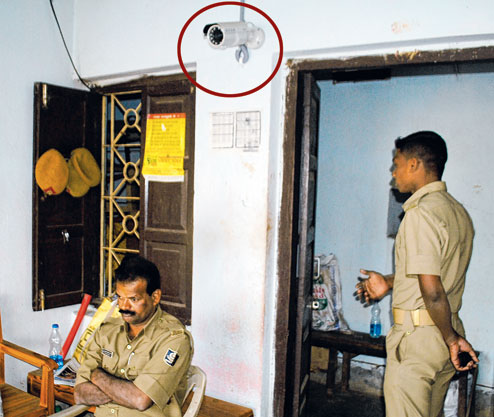
Installation of CCTV cameras was mandated at all police stations and in the offices of central agencies like the CBI, NIA, etc by the Supreme Court recently. While issuing the directives, the Supreme Court reiterated the implementation of its earlier directive of videography of the crime scene. In order to ensure that no part of the police station is left uncovered, imperatively CCTV cameras were directed to be installed at all entry and exit points, main gate of the police station, all lock-ups , all corridors, lobby, reception area, all verandas/outhouses, inspectors’ rooms, sub-inspectors’ rooms, areas outside the lock-up room station hall, in front of the police station compound, outside and not inside the toilets, duty officer’s room and back part of the police station.
The system installed must be equipped with night vision and with audio and video footage and the storage of CCTV cameras should be in digital or network video recorders, with data to be preserved for a period of 18 months preferably but certainly not less than one year.
The purpose of issuing such an imperative direction was to maintain control over human rights violations at police stations and to assist the human rights commissions and courts while dealing with complaints against police.
Whenever there is information of force being used at any police station resulting in serious injury or custodial death, it is necessary that persons are free to complain for redressal of the same not only to human rights commissions but also to human rights courts.
To further protect human rights and to curb atrocities committed at police stations, the Bombay High Court (Aurangabad Bench) went a step ahead and directed all police stations in Maharashtra to maintain registers detailing the daily functioning of the CCTV cameras to prevent custodial torture as many police stations were routinely making submissions that CCTV system is not functional when footages pertaining to harassment at police stations were sought by courts.
In most of the police stations in the country, including Goa, suspects without being formally arrested are kept in custody at police stations for several hours under the guise of investigation when in fact the duty of the police is to arrest the suspect immediately by following the guidelines of the Supreme Court and then subsequently conduct custodial interrogation rather than keeping the suspect in custody and subjecting him to force without formally arresting him.
The term “custody” for the purpose of bail or habeas corpus relief does not actually mean physical detention in jail or prison but rather is synonymous with restraining liberty and perhaps may be due to ignorance or with malafides. Several police stations in Goa in spite of keeping the suspect in their custody at police stations without formally arresting, come up with a defence that the suspect is not arrested and therefore bail filed without formally arresting the suspect is not maintainable.
When the person is in duress either because he is held by the investigation agency or other police or allied authority or is under the control of the court having been remanded to judicial order or having
offered himself to court’s jurisdiction and submitted to its orders by physical presence, the person is in custody for the purpose of bail, which the police in the state of Goa have to understand and comply with.
The equivocatory quibblings and hide and seek niceties sometimes heard in courts that the police have taken a person into informal custody but not arrested him, have detained him for interrogation but not taken him in formal custody and other terminological dubieties are unfair evasions of the straightforwardness of law, which the police have to take a serious note not only in the state of Goa but in the entire country.
The Law, Home Department and the Government of Goa needs to implement the judgement of the court immediately by taking a serious note of it and has to ensure that CCTV cameras with audio as directed by the court are installed and are in operation in order to curb human rights violation in the state of Goa.
(The writer is a criminal advocate having office at Mapusa)